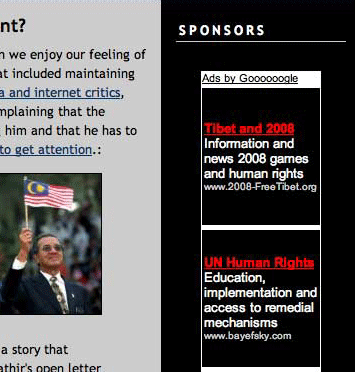 There is a debate on whether or not the Lonely Planet China and Taiwan editions of the popular travel guide are banned from the mainland. Bingfeng notes that he has several LP editions that were purchased in China.
There is a debate on whether or not the Lonely Planet China and Taiwan editions of the popular travel guide are banned from the mainland. Bingfeng notes that he has several LP editions that were purchased in China.
AsiaPundit will note that the state-owned bookstore that is across from his office does sell the Lonely Planet Shanghai city guide, and several other editions of the guide for other Asian locations. However, there are no editions for Taiwan, China or Greater China.
Marc Van der Chij’s, in an item linked to here earlier, noted a conversation he had with a clerk at Shanghai’s best English-language bookstore.:
I could not find the China guide, so I assumed it was sold out. Then I looked for the Beijing guide, and did not find it either. The Tibet guide maybe, as as preparation for next year’s bike trip? No luck. I asked the shop assistant, and he explained to me that in China it is not allowed to sell the Lonely Planet guides for China, Beijing and Tibet.
Fons describes the ban as an “urban myth.” AsiaPundit does not believe that to be the case. Mainland authorities are very sensitive to maps that depict Taiwan as a separate state, and there is a general ban on maps that do so. This is old news.
If there is an urban myth, it is the myth that that the CPC Censorship Machine is efficient.
There are massive gaps in the Great Firewall of China through which ’sensitive’ information is available on the internet (even without the use of proxy servers). AsiaPundit has picked up locally published expat magazines that have addressed the ‘question of Tibet.’ We expect that more than 90 percent of satellite receivers are illegal. And, of course, none of those pirated DVDs that can be picked up at the neighborhood shops or street-stall vendors are state-approved (though some may be made by state-owned enterprises).
Most of this, it should be said, happens in the margins and in the black-market economy. But even in the heavily regulated world of state-run bookstores things will get through. The state-run SBT Bookstore near AsiaPundit global headquarters, and various other outlets throughout the city, are still selling copies of Jung Chang’s Wild Swans.
China does ban maps that display an independent Taiwan. And if the Lonely Planet does display such maps it would be included under such a ban. However, the CPC Censorship Machine is a rickety and incompetent beast and it misses more material than it catches.
We are incredibly thankful for this.
Technorati Tags: asia, censorship, china, east asia, jung chang, media, northeast asia, lonely planet
 So I give you the example of Mr Brown’s column in Today. Some of you may have read it, some of you may not. But it hit out wildly at the government and in a very mocking and dismissive sort of tone. So MICA [Ministry of Information, Communications and the Arts] replied. How can you not reply? And some Singaporeans feel we were too harsh, we should have been gentler, or maybe just even accepted it, it is just niceness, he didn’t mean us any harm.
So I give you the example of Mr Brown’s column in Today. Some of you may have read it, some of you may not. But it hit out wildly at the government and in a very mocking and dismissive sort of tone. So MICA [Ministry of Information, Communications and the Arts] replied. How can you not reply? And some Singaporeans feel we were too harsh, we should have been gentler, or maybe just even accepted it, it is just niceness, he didn’t mean us any harm. Mee Siam has never had cockles as an ingredient. Two other distinctly Singapore dishes use cockles. Laksa and Fried Kway Teow Noodles. Most Singaporeans know this. Its a fact of life.
Mee Siam has never had cockles as an ingredient. Two other distinctly Singapore dishes use cockles. Laksa and Fried Kway Teow Noodles. Most Singaporeans know this. Its a fact of life.
 Reporters Without Borders today condemned the Singapore government for putting pressure on on the Far Eastern Economic Review and four other foreign publications to censor themselves.
Reporters Without Borders today condemned the Singapore government for putting pressure on on the Far Eastern Economic Review and four other foreign publications to censor themselves.
 …Wild Swans is not allowed to be published in Mainland China. The regime seems to regard the book as a threat to the Communist party’s power. Wild Swans is a personal story but it reflects the history of twentieth-century China from which the party does not come out well. To justify its rule, the party has dictated an official version of history, but Wild Swans does not toe that line. In particular, Wild Swans shows Mao to have criminally misruled the Chinese people, rather than being basically a good and great leader, as Peking decrees.
…Wild Swans is not allowed to be published in Mainland China. The regime seems to regard the book as a threat to the Communist party’s power. Wild Swans is a personal story but it reflects the history of twentieth-century China from which the party does not come out well. To justify its rule, the party has dictated an official version of history, but Wild Swans does not toe that line. In particular, Wild Swans shows Mao to have criminally misruled the Chinese people, rather than being basically a good and great leader, as Peking decrees. .. tensions will erupt when strongman Lee Kuan Yew dies. Mr. Chee notes that the ruling party is so insecure that Singapore’s founder has been unable to step back from front-line politics. The PAP still needs the fear he inspires in order to keep the population in line. Power may have officially passed to his son, Lee Hsien Loong, but even supporters privately admit that the new prime minister doesn’t inspire confidence.
.. tensions will erupt when strongman Lee Kuan Yew dies. Mr. Chee notes that the ruling party is so insecure that Singapore’s founder has been unable to step back from front-line politics. The PAP still needs the fear he inspires in order to keep the population in line. Power may have officially passed to his son, Lee Hsien Loong, but even supporters privately admit that the new prime minister doesn’t inspire confidence. SHANGHAI (XFN-ASIA) - The Walt Disney Co movie ‘Pirates of the Caribbean 2: Dead Man’s Chest’ has been banned from cinemas in China because it depicts people eating human flesh, the Shanghai Daily reported citing a cinema company official.
SHANGHAI (XFN-ASIA) - The Walt Disney Co movie ‘Pirates of the Caribbean 2: Dead Man’s Chest’ has been banned from cinemas in China because it depicts people eating human flesh, the Shanghai Daily reported citing a cinema company official.



 “As more and more illegal and unhealthy information spreads through the blog and search engine, we will take effective measures to put the BBS, blog and search engine under control,” said Cai Wu, director of the Information Office of China’s Cabinet, quoted by the official Xinhua News Agency.
“As more and more illegal and unhealthy information spreads through the blog and search engine, we will take effective measures to put the BBS, blog and search engine under control,” said Cai Wu, director of the Information Office of China’s Cabinet, quoted by the official Xinhua News Agency. “Piracy cost filmmakers US$2.7 billion (HK$21.06 billion) last year, with domestic firms shouldering more than half those losses, according to a study commissioned by a trade group representing the major Hollywood studios. China’s film industry lost US$1.5 billion in revenue to piracy, while US studios lost US$565 million, according to data released Monday by the Motion Picture Association…Some 93 percent of all movie sales in China were of pirated versions of films, according to the latest study.”
“Piracy cost filmmakers US$2.7 billion (HK$21.06 billion) last year, with domestic firms shouldering more than half those losses, according to a study commissioned by a trade group representing the major Hollywood studios. China’s film industry lost US$1.5 billion in revenue to piracy, while US studios lost US$565 million, according to data released Monday by the Motion Picture Association…Some 93 percent of all movie sales in China were of pirated versions of films, according to the latest study.”
 They are the handiwork of the lukayo, women way past their sexual prime who dance at weddings where they wave the phalluses like trophies, brandish them like swords, twirl them like batons, or thrust them like, well, phalluses.
They are the handiwork of the lukayo, women way past their sexual prime who dance at weddings where they wave the phalluses like trophies, brandish them like swords, twirl them like batons, or thrust them like, well, phalluses.



 A wide range of investors, including retirees and Wall Street professionals, attended the meeting at Google’s Mountain View campus. They peppered the two founders and Chief Executive Eric Schmidt with questions about everything from new products to sluggish e-mail to competition with Microsoft and Yahoo.
A wide range of investors, including retirees and Wall Street professionals, attended the meeting at Google’s Mountain View campus. They peppered the two founders and Chief Executive Eric Schmidt with questions about everything from new products to sluggish e-mail to competition with Microsoft and Yahoo. What is Torpark, exactly?
What is Torpark, exactly? What I didn’t bargain for was individual self-censorship, unspoken policies and rules, and the stoutness with which people swallowed their journalistic dignity and integrity (because it does exist, even strongly, in some places) to toe the party line. Incredible as it seems, reporters in Singapore do have the same fierce pride in their work as reporters anywhere else; I think this is especially evident in sections of the media that don’t touch on politics.
What I didn’t bargain for was individual self-censorship, unspoken policies and rules, and the stoutness with which people swallowed their journalistic dignity and integrity (because it does exist, even strongly, in some places) to toe the party line. Incredible as it seems, reporters in Singapore do have the same fierce pride in their work as reporters anywhere else; I think this is especially evident in sections of the media that don’t touch on politics. Authorities in Singapore have arrested Workers’ Party candidate
Authorities in Singapore have arrested Workers’ Party candidate  SINGAPORE : The Returning Officer for the General Election has ordered the Singapore Democratic Party to take down audio files and podcasts from its website.
SINGAPORE : The Returning Officer for the General Election has ordered the Singapore Democratic Party to take down audio files and podcasts from its website. My ad was being shown on the uncensored Chinese language Google, but not the censored Google.cn. Google checks what ads to deliver by location (determined by IP address) and the language setting of your browser. Despite both of these showing that my language was Chinese and my location was in China the ad did not properly appear.
My ad was being shown on the uncensored Chinese language Google, but not the censored Google.cn. Google checks what ads to deliver by location (determined by IP address) and the language setting of your browser. Despite both of these showing that my language was Chinese and my location was in China the ad did not properly appear.
 The Hong Kong Journalists Association and Reporters Without Borders have campaigns to save Ching Cheong, a Hong Kong journalist charged by China with spying. RSF says he faces a possible death sentence although the Chinese authorities have produced no evidence against him.
The Hong Kong Journalists Association and Reporters Without Borders have campaigns to save Ching Cheong, a Hong Kong journalist charged by China with spying. RSF says he faces a possible death sentence although the Chinese authorities have produced no evidence against him. Reporters Without Borders today said it considered Chinese blogger Hao Wu to be the victim of state abduction as more than two months have gone by since his arrest by the National Security Bureau in Beijing without his family getting any news about him. His lawyer has not been allowed to see him, but has been told his client is under house arrest.
Reporters Without Borders today said it considered Chinese blogger Hao Wu to be the victim of state abduction as more than two months have gone by since his arrest by the National Security Bureau in Beijing without his family getting any news about him. His lawyer has not been allowed to see him, but has been told his client is under house arrest.
































